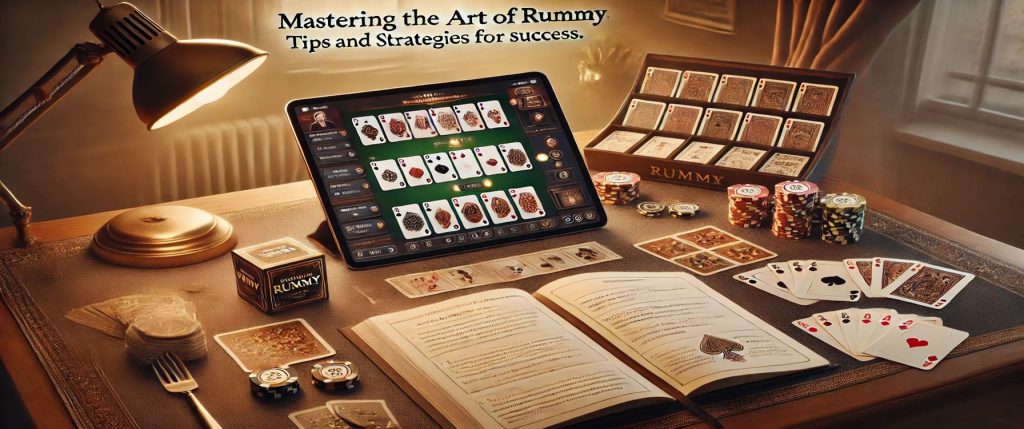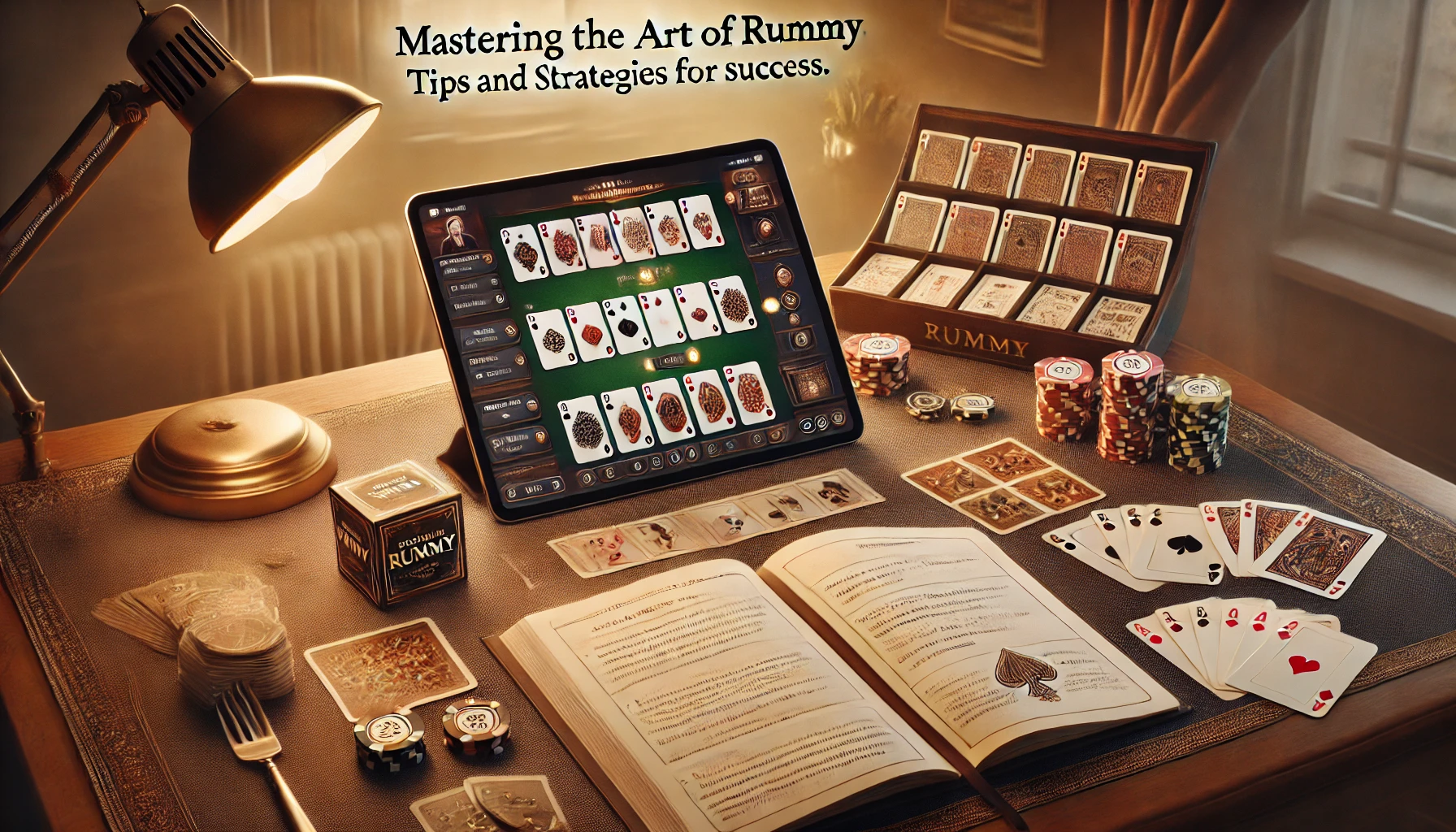Mastering the Art of Rummy: Tips and Strategies for Success

Mastering Rummy: A Complete Guide For generations, players have been enthralled with the timeless card game of rummy. It is popular with both serious competitors & casual players due to its unique combination of skill, strategy, & a little bit of luck. Any player who wants to get better at rummy must grasp the fundamentals. Forming sets and runs from the cards in your hand is the fundamental activity of rummy. A run is a series of three or more cards in the same suit, whereas a set is made up of three or four cards of the same rank but different suits.
Getting all of your cards to merge into legitimate sets and runs before your opponents do is the goal. Depending on the version of the game being played—Indian Rummy, Gin Rummy, or Kalooki, for example—the rules may differ slightly and the game can be played with two or more players. In order to succeed at Rummy, players need to understand not only the rules but also the subtleties that can affect how the game turns out.
This includes being aware of the scoring system, which normally determines how many points are awarded depending on the cards that remain in the hands of opponents after one player leaves. It’s also critical to be familiar with the composition of the deck; knowing how many cards are in play & which have already been discarded can give you important information about what your opponents might be holding. Players can start creating strategies that will increase their chances of winning as they gain more comfort with these principles.
In Rummy, as in any competitive game, having a winning mentality is essential. It is essential for players to develop a mindset that values perseverance and patience. Because of the nature of rummy, players must maintain composure under pressure, even in the face of difficult circumstances or unfavorable hands. Acknowledging that every game presents a chance to grow and learn is essential to cultivating this mindset.
Instead of just thinking about winning or losing, players should concentrate on how they make decisions. After every game, they can examine their decisions and results to pinpoint areas that need work and gradually hone their tactics. Also, maintaining emotional control is crucial to winning at rummy.
Gamers frequently go through phases of excitement or frustration that impair their judgment. Using mindfulness practices that support concentration & clarity while playing is crucial to combating this. To regain composure, this may entail taking deep breaths, imagining successful outcomes, or even taking a brief break. Players can improve their performance and raise their chances of winning at the Rummy table by cultivating a positive and focused mindset. Discarding is a crucial component of rummy that has a big impact on how the game turns out. Selecting which cards to discard requires strategy on the part of the player because it not only impacts their own hand but also gives their opponents information.
A well-placed discard can prevent opponents from finishing their own melds or even give them false information about how strong your hand is. Creating a successful strategy requires an understanding of the ramifications of each discard. It can be dangerous to discard high-value cards when you think your opponent is about to go out, for example, because you might unintentionally help them form their melds.
Players should also keep an eye on which cards their opponents are discarding. This data can reveal important details about the cards they might be holding and the melds they are attempting to form. Players can decide which cards to hold onto and which to discard by looking for trends in discards. The art of discarding involves more than just getting rid of cards you don’t need; it also involves strategically managing your hand and impeding the progress of your opponents. To increase your chances of winning at rummy, you must properly arrange your hand.
With a well-organized hand, players can make strategic choices about which cards to keep or discard and swiftly spot possible melds. Sorting cards by rank and suit is a useful tactic that helps identify potential runs and sets by forming distinct visual clusters. For instance, you can quickly determine if you are close to finishing a run if you have multiple cards in the same suit.
This arrangement helps you stay focused while playing the game in addition to streamlining your thought process. Flexibility is a crucial component of hand organization. As the game goes on, it’s just as crucial to stay flexible as it is to have a plan for your melds. Players may need to reevaluate their plans and rearrange their organization as new cards are drawn & discarded.
For example, it might make sense to switch to forming sets if you had originally targeted a particular run but saw that your opponent was gathering cards that were similar. This flexibility may be essential for outwitting rivals & taking advantage of openings when they present themselves. The ability to identify patterns and sequences is a crucial Rummy skill that can significantly improve a player’s strategic approach.
A keen sense of which cards will probably be drawn or discarded based on past plays is frequently developed by seasoned players. They are able to make well-informed decisions about which cards to keep or discard themselves because they can predict moves. An opponent may not be pursuing that suit for their melds, for example, if you observe that they routinely discard cards from that suit.
You can take advantage of this information by stockpiling those cards. Also, by recognizing typical gameplay patterns, players can spot possible enemy traps. When an opponent discards a seemingly insignificant card but then picks up another card from the same suit, for instance, it could be interpreted as an attempt to deceive you about their intentions. In order to stay ahead of their rivals, players can better negotiate the intricacies of Rummy and make strategic choices by remaining aware of these patterns and sequences.
When used properly, the Joker, a potent card in rummy, can drastically change the course of the game. Since it can act as a wild card to represent any card required to finish a run or set, it is a very useful tool for creating melds. Nonetheless, players need to use Jokers strategically in terms of when and how they employ them.
Early use of a Joker can limit your options later on in the game by giving opponents a sneak peek at your strategy. Alternatively, think about keeping it until you have a better understanding of your hand & the tactics of your opponents. It’s also critical to understand when to refrain from using a joke. Keeping it as leverage against your opponents instead of using it right away in your own melds may be more beneficial in some situations. For example, keeping your Joker could keep your opponent from finishing their hand if you think they are about to go out but are missing one particular card for their melds. By carefully considering the advantages & disadvantages of using Jokers during gameplay, players can stay ahead of the competition and increase their effectiveness.
Developing Your Rummy Observation Skills. Rummy beginners frequently overlook this essential component of learning the game: paying attention to your opponents’ moves. It is possible to gain important insights into the tactics & intentions of others by closely observing how they play. They can identify the melds they are trying to form, for instance, by noting which cards they draw from the deck and which ones they take from the discard pile. Changing Your Approach.
You can then modify your own strategy accordingly, either by preventing them from finishing their sets or by predicting the cards they might require. Also, you can anticipate your opponents’ next moves more accurately if you are aware of their tendencies. A more conservative approach may be taken by some players, while others may have particular patterns in their play, such as favoring particular suits or being more aggressive with discards. Taking Advantage of Weaknesses & Countering Strategies. By identifying these patterns, you can modify your gameplay to successfully counteract tactics or take advantage of weaknesses.
Not only does this degree of observation improve your own gameplay, but it also gives the game an intriguing psychological warfare element. When used properly, bluffing, a sophisticated rummy tactic, can completely change the outcome of a game. By making your opponents doubt the strength or intent of your hand, you are essentially bluffing. For example, you may discard cards that appear insignificant while keeping important cards for your melds if you have a strong hand and wish to trick your opponents into believing you are having trouble.
This strategy may lead opponents to make snap judgments based on false presumptions about your hand. However, bluffing effectively necessitates a deep comprehension of risk management and human psychology. Depending on the dynamics of the game and the personalities involved, players must determine when it is appropriate to bluff. Knowing which opponents are most likely to fall for your ruse is essential for successful execution because some opponents may be more prone to bluffs than others. Also, keeping your style of play constant helps reinforce your bluffs; if you abruptly alter your behavior without cause, astute opponents might quickly identify it.
Gaining proficiency in this art will make your gameplay more complex & keep your opponents guessing all the time. In conclusion, mastering Rummy entails much more than just understanding the rules; it also entails cultivating a strategic mindset, improving observational abilities, and using sophisticated strategies like effective discarding and bluffing. Players can improve their skills from casual play to competitive excellence by thoroughly comprehending these components & practicing frequently. These tips will help you confidently & skillfully negotiate the complexities of Rummy, whether you’re playing with friends at home or competing in tournaments.
